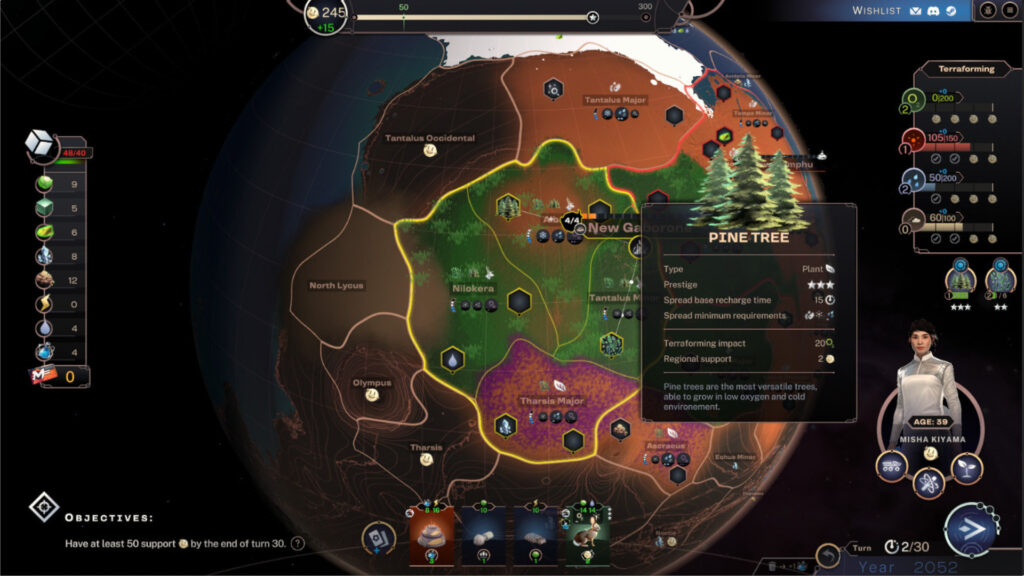Explore Mars, build and develop your cities, manage your resources, and transform the Red Planet into a Green Planet
Developed by Asteroid Lab and published by Goblinz Publishing, Terraformers is an ambitious new 3X (eXplore, eXpand, eXploit – but no eXterminate!) city builder in the form of a roguelike. Earth is colonizing Mars, and it’s up to you to ensure that the terraforming proceeds smoothly. In order to do so, you will have to make many critical decisions in managing your resources effectively and keeping your fledgling population happy while progressively increasing the habitability of the harsh, inhospitable planet.
First off, there’s an undo button. Most actions other than exploration can be undone. This alone makes me want to give Terraformers a 9/10. Thankfully, the rest of Terraformers is just as indicative of its expert and wonderful design. It has all manner of clean and original art with a refreshing and vibrant style. Its music is beautiful and extremely fitting for this sort of optimistic sci-fi setting, though the logic for BGM selection could be improved. The UI is simple and mostly intuitive, although I would like to dock a point for what it is in its current early access form because it definitely could be better. Even the science of the sci-fi is mostly grounded and based on current tech, which definitely makes Terraformers approachable for space fanatics everywhere. But ultimately, the gameplay itself is deep, thought-evoking, addictive, and wonderfully satisfying, and I find myself glued to the seat until the end of every run.
What exactly is “terraforming”?
Terraforming refers to the process in which a planet is made habitable for Earth-based lifeforms. The target planet in Terraformers is our friendly neighborhood red planet Mars, which has been long thought of as the first potential stepping stone for human civilization to become a space-faring species. In comparison to Earth, Mars is desperately lacking a breathable atmosphere, a water cycle, and a consistent livable climate, which are the cornerstones for life flourishing here on Earth. In Terraformers, your four terraforming parameters are temperature, oxygen, ocean level, and atmosphere. As you increase each parameter through their three tiers, the planet becomes more habitable for life, and life can be introduced to those zones that can support them.
Of course, no terraforming process would be complete without introducing life. Terraformers offers three types of lifeforms to be spread on the Martian surface: bacteria, plants, and animals. Bacteria have low requirements to survive and can offer some interesting utility, such as increasing temperature, or even generating resources such as titanium or tritium. Plants also generally provide oxygen or some other small benefits, but otherwise plants and animals are generally there to provide support to your population. All lifeforms also work on a prestige system, wherein the more they are spread, the more support they generate. If you ever wanted a planet just covered in grizzly bears and Arctic pine forests, this is your opportunity.
You are given many tools in order to raise those life-giving parameters and propagate life. Carbon dioxide factories can be built in order to create an atmosphere and increase planetary heat retention. Genetically engineered bacteria can be used to generate oxygen. Martian aquifers can be breached and extracted to contribute to the Martian oceans, which form the foundation of the water cycle. You can even turn to space for your terraforming needs, importing atmosphere or oceans from other nearby celestial bodies. All of these options and more are at your disposal, so long as you have the resources for it.
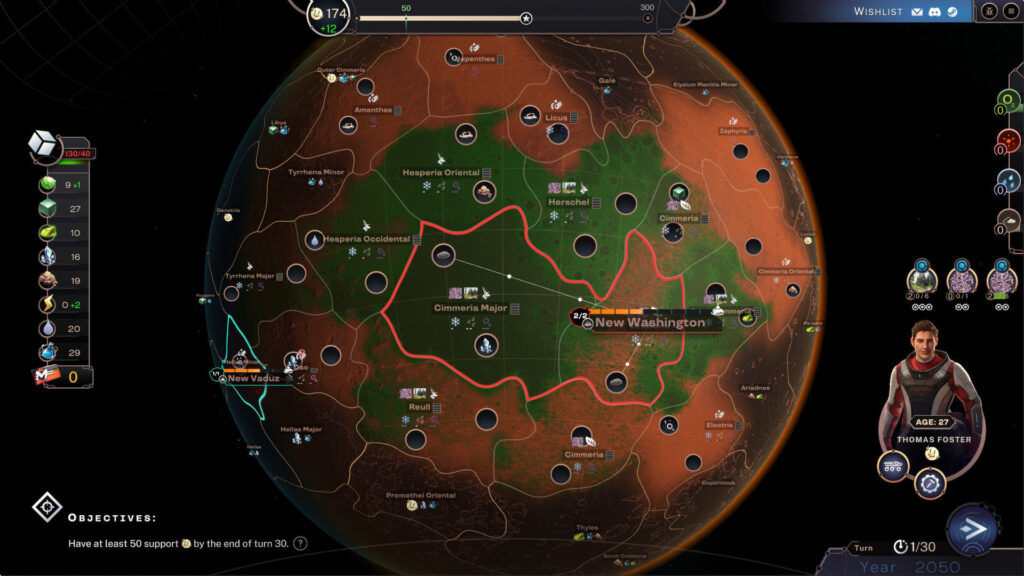
eXplore, eXpand, and eXploit on your path to a greener Mars
Naturally, any large scale project requires a considerable amount of resources, but given that we’re working on a different planet altogether, Martian problems require Martian solutions. Your terraforming efforts will be built on the foundation of resources that are gathered from the surface of the Red Planet.
In Terraformers, you begin with just a single city, a few buildings in your hand, and the resources to build a single mine. You also have the planet’s surface to yourself, which is covered in all manner of strange Martian features – glittering crystal caves, wondrous rock formations, expansive lava tunnels, and dried basins that can be filled with oceans, all waiting to be discovered. Amongst the wonderful is also the mundane necessities of open pit mines for the countless amount of resources needed to fuel development.
While all resources can be found during the course of regular exploration, some resources (food, power, and research) are more regularly generated by buildings in cities, and others (water, nitrates, silicates, titanium, and tritium) are more regularly obtained from mines on the Martian surface. These materials are typically used for buildings within a certain type – for example, water or nitrates are commonly found in food production buildings, silicates are typically used for research or high-tech, and titanium is used for all sorts of mundane tech. As you begin mining, you are able to trade those resources with Earth for others that are more urgently needed for your immediate development. For instance, food is used to either expand your population in a city, or to found a new city elsewhere; power is used every turn for exploration, as well as to construct mines.
Your defeat condition revolves around the resource known as support, which is the happiness level of your fledgling Martian population. It is generated by good city design, improving comfort of living, and can also be discovered via exploration, but as time passes, the amount of negative support generated by the population increases, meaning it’s a constant balancing act spending resources on economic development and support. On higher difficulties, there is a point in the mid-game where you are cruising along the razor’s edge, always within a few turns of defeat. Victory depends on whether you can pass a critical level of resource generation in that time to firmly establish your support production.
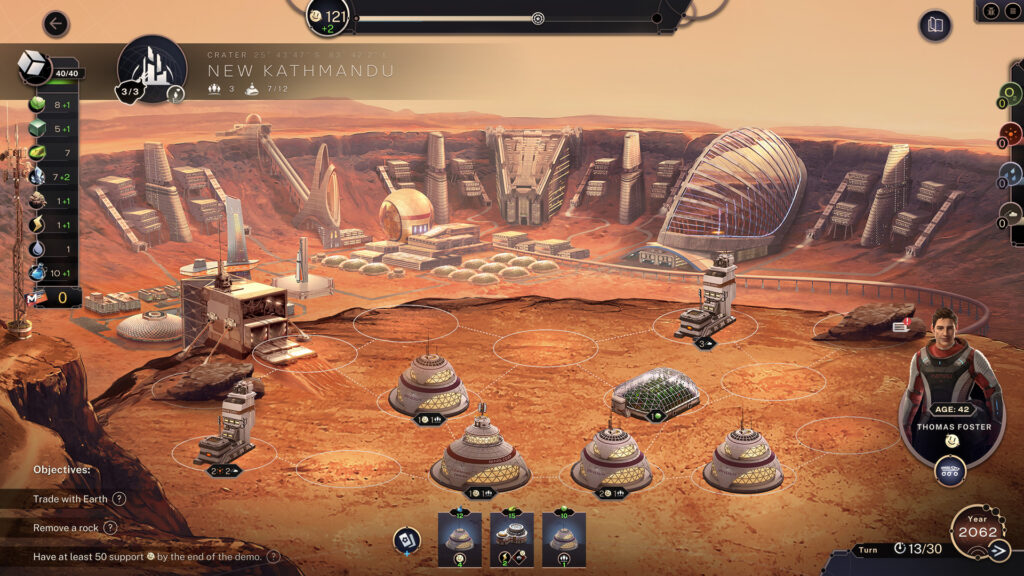
Complex decision making involved in multi-dimensional city building
Unlike many other city-building or civilization-sprawling games, Terraformers allows you to develop your cities on both a local scale and a planetary scale.
A city has a limited number of plots for buildings, and those plots are arranged in different patterns for each city. There are ideal patterns to design certain elements of your city – for example, housing always has adjacency bonuses for support, and selecting the right buildings for a residential cluster within a certain plot pattern can mean the difference in surviving just one more turn.
As far as planetary development goes, all development occurs on locations that are discovered through exploration. Locations can have specific features, such as terrain for city-building like craters, or high ground that can grant bonus yields to buildings such as solar panels. There is also low ground that will eventually be covered by the rising sea level, but dikes can be constructed to keep them dry. However, a city needs to be expanded to the location in order to utilize it, namely through increasing its population or constructing buildings like bus stations.
This dual layer of city development allows for considerable amount of interesting decision making as you juggle this complex development of a dozen cities per run with expanding your resource generation and trying to achieve the victory conditions.

A confluence of many simple concepts and roguelike elements results in an impressive level of depth
Each step in the terraforming process is clear, but roguelike RNG forces a considerable amount of decision-making on every turn, and makes every run feel fresh and unique. You will never have two identical cities in a single run, and your developmental path for each run will be wildly different.
To begin with, city development does not occur like other city builder games – rather than selecting buildings to construct based on your current technology level, you are able to choose one of several buildings to add to your “hand” every turn, and can choose to construct any building from your hand at any time. The offered buildings get progressively more advanced, and thus you are able to complete more ambitious projects as time goes on. There is a strict limit to how many cards you can have in your hand at once, which encourages you to play for the now, rather than saving forever for a future that may not come. It may be tempting to pick up a GMO lab to greatly ramp up food production, but if you do not have the adequate science production, that card might take up a precious slot in your hand for many turns, which can severely restrict your options. At the same time, the science resource is used in the building that increases your hand limit, which means you’ll have to decide between a greatly boosted food production or increasing the chances of obtaining another extremely valuable building the next turn, such a space telescope that can generate a ridiculous amount of science per turn. You will always be barely short of a particular resource, and while waiting to accumulate a sufficient amount, your attention will be ripped away towards another tantalizing new project that will completely derail all your previous plans.
At the start of every run, you are also prompted to select a leader. There are many leaders that each have special active abilities and a special passive ability, and you will be able to perform one action with them per turn. However, you are only able to choose from two randomly selected leaders at a time, and they retire after 10 turns, though their passive ability will remain with you for the rest of the run. Each leader will specialize in a particular area, whether it is resource generation, exploration, population support, or directly improving your terraforming parameters.
While the full release will offer additional game modes such as the highly anticipated endless mode, currently in Early Access, Terraformers offers a selection of victory conditions, and you choose one as an end-goal for your forthcoming run. For instance, you can choose to raise all four terraforming parameters to a certain level, or you can choose to propagate a certain amount of lifeforms. Each run then becomes a race to complete the objective as soon as possible, and you are scored based on your speed and performance. However, the run ends as soon as the objective is complete, which is a bit disappointing for prospective players who are looking to make an entirely green planet.
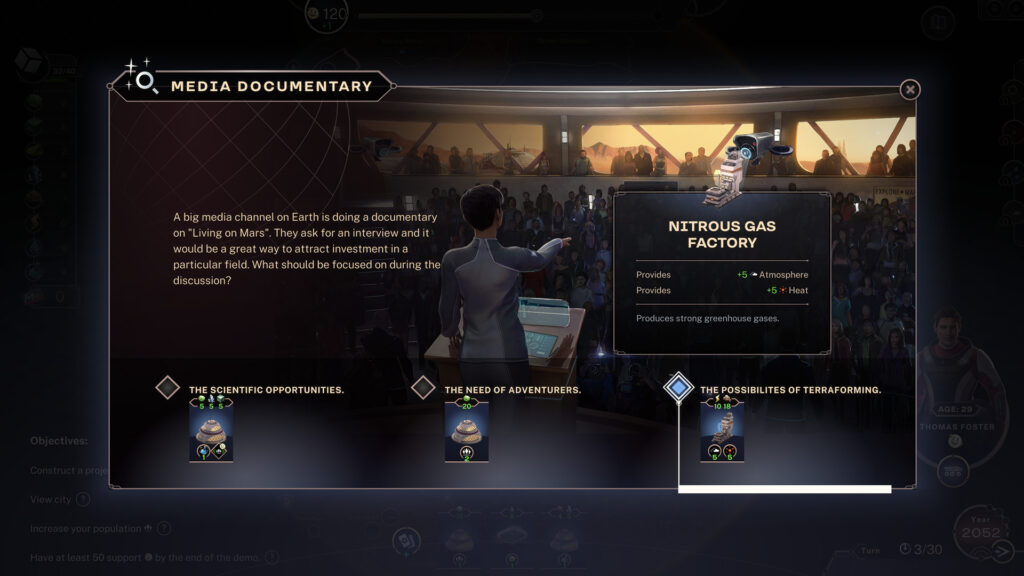
Plans for release, and roadmap for the future
Currently, Terraformers is playable in an early access build, and additional features and content are planned to be included in the full release. This includes some modern staples such as an in-game wiki and the aforementioned endless mode (which is actually a fully featured custom mode), as well as a new feature known as Technologies, which are played like space projects but only require the science resource.
There is also a roadmap for all the updates up until release, which include a considerable amount of gameplay content and features. The roadmap can be viewed below.
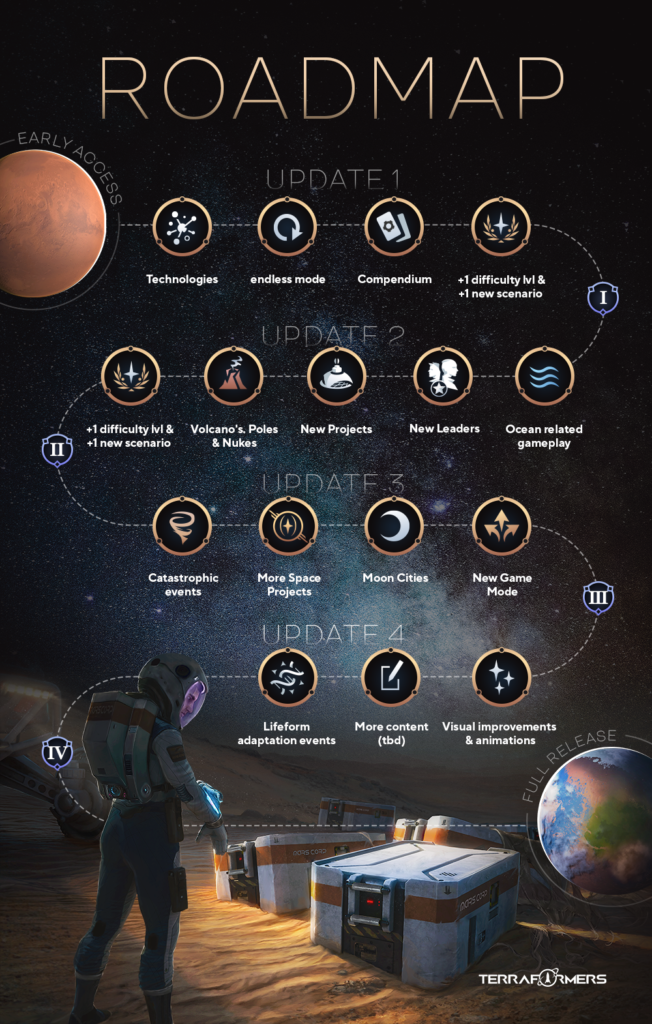
Overall Score: 9.5/10
As a lover of roguelike and simulation games, and as a general enthusiast about space and sci-fi, Terraformers has definitely left a considerable impression on me. Its wonderfully addictive gameplay loop is wrapped in an immersive and lovingly crafted package that delivers on all fronts. While it’s undeniable that it is currently in an unfinished early-access state, the developers communicate frequently with the community and have shown several glimpses into the finished product, which show immense promise. Many of the issues that I’ve had with Terraformers are UI-related, but it appears that the UI, among many other aspects of the game, are due for a final layer of polish that will truly propel this game into greatness.
Terraformers was released for Early Access on Steam and GOG on April 21, 2022. There is no set date for full-release, but is expected to be within the next 6 months. Terraformers currently has localization for English, French, German, Spanish, and Russian.
There is a Discord available for the game, where the community can interact with the developers directly to learn more about the game, discuss development, and report issues.

